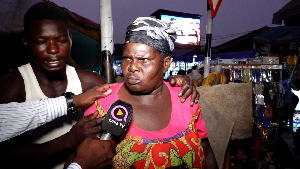It is Ghana’s single most prized edifice. It started off in 2007 as a 30 million US dollar project, but additional investments raised the cost to over USD200 million by the time it was ready for occupation. And yet as it stands today, and like most other state properties, the Flagstaff House is NOT INSURED.
In the wake of the numerous unexplained fire outbreaks that the country experienced recently, the Scandal has been wondering why by law, citizens are obligated to insure their properties including even very old ‘trotros’, yet the state which made the law does not insure any of its own properties.
We found no history behind this anomaly, but it appears the colonialists who introduced the western type of administration to us did not think it worthwhile to insure state properties of their colonies firstly because they had no intention of building an assets base for their colonies, and secondly because there were no indigenous insurance companies to take the risk.
Off course, with the colonialist’s home insurance broker, they insured their exports, the ships and cargo that left the shores of Africa with their booty. Unfortunately, Ghana’s post-independence administrators continued with the void, acquiring assets without insuring them against any eventualities.
Indeed it was not until 1965 when insurance was officially introduced into the Ghanaian economy, but by this time, the assets base of Government had grown so large that annual insurance premiums on all those assets would have created a big hole in Government’s finances, and so it was considered not worth it.
And it came to pass that no Government property is insured. Movable and unmovable properties, mandatory or selective, the word Government is the insurance. And so when you have an accident with a government vehicle, the government pays compensation in cases of damages, injuries or even death. The Judgment Debt Commissioner is currently dealing with a lot of such debts.
Recently, at Nkwanta in the Volta Region, some rampaging youth vandalized government properties and burnt down about six government vehicles in protest against the re-nomination of their District Chief Executive (DCE). Those damaged vehicles were not insured and so no, there cannot be indemnity.
But have you ever thought about what Ghana Government lost during the fire outbreak at the Foreign Ministry in 2009? What did we lose? Who really knows? Do we even have an Assets Register? Have you thought about all the protocols, international agreements, conventions with other nations, and business entities that were lost in that fire? All we did was to pack into a wing of the Flagstaff House and business continued as usual.
We have developed for ourselves some new infrastructure in the last decade or so including the Accra International Conference Centre, the new Stadia (Accra, Sekondi and Tamale), the New Foreign Affairs building at Airport, the new Ministry of Defense. Will it be too much to ask that at least we select for insurance some of these assets, especially those that are patronized by members of the public regularly and in large numbers.
There is actually a law passed in 2006 which requires compulsory insurance for all public buildings. Act 724 which was passed in 2006, but surprisingly implemented in August 2011, requires all property owners to have both liability and fire insurance. Like motor vehicles, it is an offence to use or cause to use any property without an insurance cover.
Another agreement the Scandal has sighted is one between the Ghana Government and the Lands Department, which makes it mandatory for all properties on public lands be insured otherwise the land reverts to the lessor after a certain period of time.
This Agreement states in part that “To keep the building or buildings upon the demised premises insured against fire with an Insurance Company of repute and in good standing in the full value determined by a qualified and reputable valuer therefore (such Insurance Company and value to be agreed upon by the parties hereto) and whenever required to produce to the Lessor the policy of Insurance and the receipt for the current year’s premium and to cause all moneys received by virtue of such insurance to be forthwith laid out in rebuilding and reinstating the premises and to make up any deficiency out of the Lessee’s own moneys and in the case the Lessee shall make default in keeping such building or buildings so insured aforesaid the Lessor may do all things necessary to affect and maintain such insurance and all moneys expended by the Lessor for that purpose shall be repayable by the Lessee on demand and be recovered as ground rent in arrears”.
The agreement, which was designed by the Lands Department as an agency of government further, states that when the above clause is not adhered to, “the Lessor would have the right to re-enter the property”.
However, checks at the State Insurance Company (SIC) revealed that, apart from the Volta River Authority (VRA), almost all state assets and property are not insured against any liability.
Scandal has, however, picked up signals that the University of Ghana, Legon, is in the process of insuring their assets with a private insurance company.
General News of Monday, 12 August 2013
Source: The Scandal













